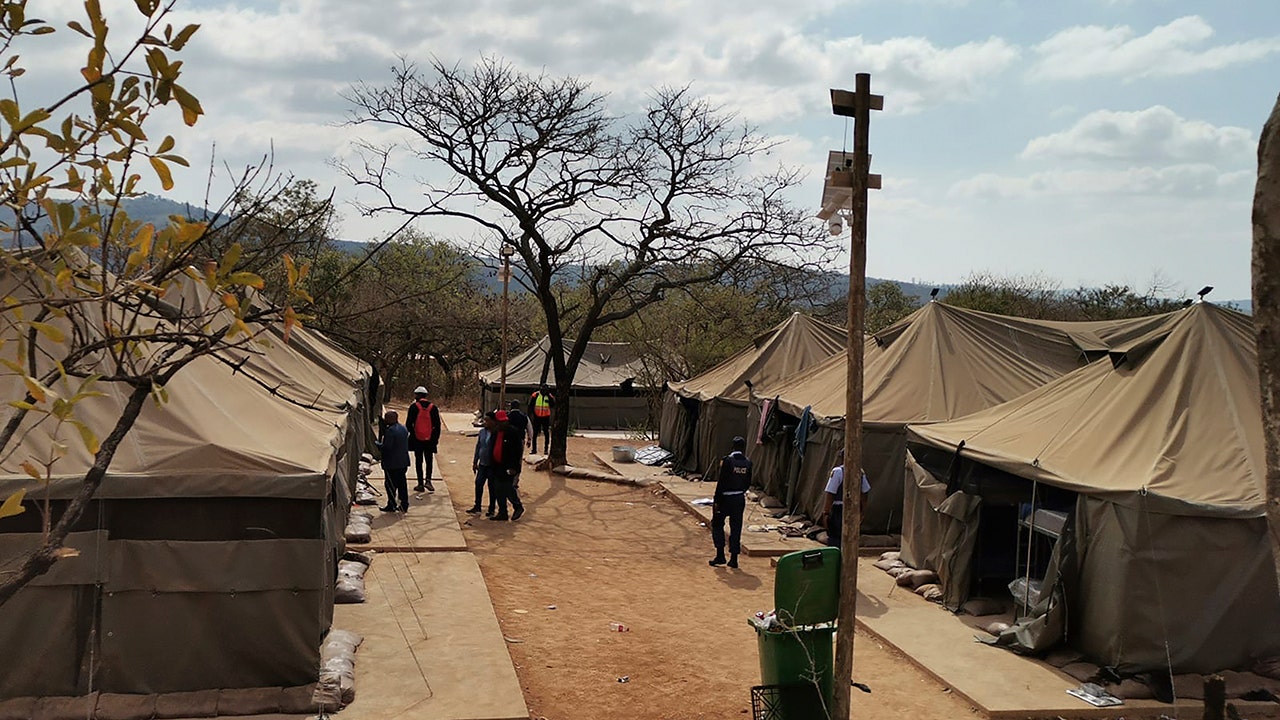World
Sudan latest: US sanctions, suspended talks, continued fighting

Sudan’s conflict has continued for a seventh continuous week, where fighting has propelled the nation into an all-out war since fighting between duelling generals from the Sudanese army and its rival paramilitary Rapid Support Forces (RSF) broke out on April 15.
The country has plunged into a humanitarian crisis, with more than 1,800 people killed, according to the Armed Conflict Location and Event Data Project, and at least 1.6 million displaced within the country or across its borders, the United Nations has said, with many fleeing to Egypt, Chad and South Sudan.
On the ground, multiple ceasefires have been violated by both parties and Saudi and United States-brokered peace negotiations have now been suspended.
Here’s the latest on the conflict:
US imposes sanctions
On Thursday, the US imposed the first sanctions related to the conflict in Sudan, warning that it will “hold accountable” all those undermining peace in the northeast African country.
The sanctions targeted firms associated with the conflict’s actors, including those controlled by RSF chief Mohamed Hamdan “Hemedti” Dagalo in the United Arab Emirates and the Sudanese capital, Khartoum, as well as two defence firms linked to the Sudanese Armed Forces, led by General Abdel Fattah al-Burhan.
The White House also said it was imposing visa restrictions “against actors who are perpetuating the violence”, but did not identify them.
The sanctions are targeted to affect those companies in a way that would make the warring parties have less ammunition to fight and force them back to the negotiating table, according to Al Jazeera’s Hiba Morgan, who was reporting from Sudan.
Fragile ceasefire and suspended talks
The US and Saudi Arabia suspended ceasefire talks late on Thursday due to repeated violations of multiple ceasefires, the countries said in a joint statement.
The Sudanese army backed out of the talks a day earlier, saying the RSF is not implementing parts of an agreement that had been signed days prior.
The Biden administration has said that it is still coordinating with its mediator counterpart Saudi Arabia, as well as the African Union and other actors in the region, to urge the warring sides to end the conflict.
Fighting continues
In a pattern marking continued violations of ceasefires, residents said heavy artillery fire could be heard in cities in Khartoum state on Thursday, including in northern Omdurman and Khartoum North.
The firing occurred despite a ceasefire that was meant to run until Saturday evening.
“Fighting has […] increased or intensified since the Sudanese army suspended its participation two days ago from the talks,” said Al Jazeera’s Morgan.
More artillery shelling took place in the southern part of the capital, Khartoum, on Thursday, Morgan added, with the Sudanese army trying to take control of a military base there that belongs to the RSF.
Outside Khartoum, the region of Darfur continues to be a hotbed of violence. A regional rights group said this past week alone at least 50 people have been killed in the westernmost city of el-Geneina, which has been experiencing a communications blackout for more than 10 days.
Humanitarian situation
The UN refugee agency said on Thursday that more than 100,000 people have fled violence in Sudan to neighbouring Chad, with that number possibly doubling in the next three months.
Chad, one of the poorest countries in the world, was already hosting about 600,000 refugees before the conflict.
Additionally, aid groups face continued troubles, with the World Food Programme reporting that nearly 17,000 tons (15,400 tonnes) of food aid have been looted since the start of the conflict.
#SUDAN: We strongly condemn the looting of @WFP food & assets happening right now in El Obeid.
Our warehouses have come under attack – and food for 4.4 million people is at stake.
It is unconscionable to steal from the hungry. This must stop.
[1/2] pic.twitter.com/QSvRt0odBl
— Cindy McCain (@WFPChief) June 1, 2023
Additionally, a curfew was placed this week on the city of Port Sudan, a key evacuation point, which has also become a base for the UN, aid groups and diplomats.
Residents say buses have been stopped from entering the city.

World
Celine Dion Makes Triumphant Comeback at Paris Olympics Opening Ceremony — Watch Full Performance

ad
World
95 Libyan nationals arrested in South Africa at suspected secret military training camp

South African police arrested 95 Libyan nationals in a raid on a suspected secret military training camp on Friday and authorities said they were investigating whether there were more illegal bases in other parts of the country.
The camp was discovered at a farm in White River in the Mpumalanga province, about 360 kilometers (220 miles) northeast of Johannesburg, police said.
ELEPHANTS KILL TOURIST IN SOUTH AFRICA AFTER HE TRIED TO GET CLOSE TO TAKE PICTURES
National police spokesperson Athlenda Mathe said in a post on the social media site X that the Libyans stated they had entered the country on study visas to train as security guards, but police investigations suggest they have received military training.
The Newzroom Afrika TV news channel broadcast pictures of the site of the arrests, showing a military-style camp with large green and khaki tents set up in a row. Dozens of men were seen lining up as they were arrested. They were wearing civilian clothing.
Local government official Jackie Macie said investigations were ongoing and the owner of the farm would be questioned. He said authorities received information that there were similar secret camps near two other towns in Mpumalanga province.
A camp where 95 Libyan nationals were arrested on suspicion of running an illegal military camp are seen lining up after their arrest on Friday, July 26, 2024 in White River, South Africa. Police say that 95 Libyan nationals were arrested on suspicion of receiving training at a secret military camp in the north of the country. (AP Photo/Bulelwa Maphanga)
The province borders neighboring countries Mozambique and Swaziland and is an area of concern for South African authorities with regards to illegal immigration.
Police and authorities have not said whether the camps are suspected of being connected to a particular group or conflict.
Macie said investigations would establish if there was a network of camps in South Africa and show “why they are here doing military training in our country.”
Police said the men may be linked to crimes reported in communities close to the farm in recent months.
“We have serious cases which have been opened with the police, including cases of rape and armed robberies, which complainants claim were committed by unknown foreigners who seem to be of Asian descent,” said police spokesman Donald Mdhluli.
“We take what we have found here today very seriously because we don’t know who was training them, what were they being trained for and why that training is happening here in South Africa. It may be a threat not only to South Africa but also to the entire southern Africa region.”
Police said the operation to arrest the Libyans and close down the camp began two days ago. Macie said the Libyan nationals had been in the country since at least April.
“The 95 individuals taken into custody are all Libyan nationals and are currently being questioned by the relevant authorities,” Mpumalanga acting provincial police commissioner Maj. Gen. Zeph Mkhwanazi said in a statement.
Mdhluli, the police spokesman, said the country’s security regulator had confirmed that the kind of training that appears to have been taking place at the camp was well beyond the scope of training for security guards.
“The kind of equipment we found here shows that there was intense military training taking place here. This was basically a military base.”
World
Passengers face long, uncertain wait at stations amid rail disruption

A deliberate fire in a signal box about 60 km south of Lille caused the disruption on the northern high-speed line, with traffic halted around 5 a.m. local time on Friday.
Travel was severely disrupted in Lille on Friday, one of the stations affected by the sabotage that hit major French rail lines ahead of the Paris Olympics opening ceremony.
Many passengers waited with hope that soon turned to resignation.
“We’ve been waiting since 10:38 a.m. for the 11:38 a.m. train, and now we’re just waiting for it to arrive at 2:08 p.m.,” said Delphine, one of the stranded passengers.
“It’s still quite a delay, and we’ll be even later since we’re on a secondary route. I work in Avignon at 9 p.m., so it’s going to be very, very tight. We have a concert tonight — will it even happen? This is all very confusing, and we don’t understand what’s going on.”
For one traveller, this was a rough start to the holidays. “The worst case would be if the train is cancelled entirely and we have to buy new tickets for next week. It would shorten our already brief vacation. That would be a huge problem,” said Hippolyte.
When asked if he had been informed of the delays, Hippolyte said he received the notification just before departure.
“At around 10 a.m. this morning, we were told we were an hour late and would be leaving at 1 p.m.”
“It just keeps getting later as the day goes on. Every time we approach the new departure time, it gets pushed back another hour and a half, or half an hour each time.”
A deliberate fire in a signal box about 60 km south of Lille caused the disruption on the northern high-speed line. Traffic was halted around 5 a.m. on Friday.
The recent acts of sabotage on the rail network highlight that the Olympic Games are turning France into a prime target.
The attack disrupted the transport system on the opening day of the Games, causing delays of up to two hours or even cancellations that affected hundreds of thousands of passengers nationwide.
Authorities in Paris have said they are deploying substantial human resources to counter any threats and to ensure the safety of the events.
-

 World1 week ago
World1 week agoOne dead after car crashes into restaurant in Paris
-

 Midwest1 week ago
Midwest1 week agoMichigan rep posts video response to Stephen Colbert's joke about his RNC speech: 'Touché'
-

 News1 week ago
News1 week agoVideo: Young Republicans on Why Their Party Isn’t Reaching Gen Z (And What They Can Do About It)
-

 Movie Reviews1 week ago
Movie Reviews1 week agoMovie Review: A new generation drives into the storm in rousing ‘Twisters’
-

 News1 week ago
News1 week agoIn Milwaukee, Black Voters Struggle to Find a Home With Either Party
-

 Politics1 week ago
Politics1 week agoFox News Politics: The Call is Coming from Inside the House
-

 News1 week ago
News1 week agoVideo: J.D. Vance Accepts Vice-Presidential Nomination
-

 World1 week ago
World1 week agoTrump to take RNC stage for first speech since assassination attempt


















